
|
Return to the Military At around the same time as the start of my educational journey, the 1980s saw my return to military service as well. The Falklands War rekindled my interest in the Forces for me. So, when I saw an advert for 2503 Auxiliary Squadron (the local RAF Regiment Reserve Forces) in 1983, I filled in the application form and sent it off. I was invited to RAF Scampton, outside Lincoln. I expected there to be a group of us, but it was just me. A Corporal asked me to get in his Land Rover and drove me to the Auxiliary Squadron’s Headquarters. “You are going for an officer?” he asked. I hadn’t planned on it but, seeing as he had suggested it, I nodded in agreement. At the office, I was met by the Adjutant, a Flight Lieutenant, who took me in to meet the Squadron Commander. Everyone just assumed that I was going for a commission. I thought it best to tell them about my time in the Naval Detention Quarters, but they didn’t seem concerned. It was necessary to go through an official Commissioning Board, but that seemed to be a mere formality. In the meantime, I began my training. It is strange how fate can steer you along certain roads and take you to goals that you never thought you would reach. I recalled how once, as a young Marine in 41 Commando, I looked out the window of my room and saw the Duty Officer doing his rounds and thought that I would like to be an officer but thought that could never happen. Nevertheless, here I was, many years later, and it was actually happening! I had done nothing to instigate this sequence of events. I had briefly dreamed of being an officer years ago and then quickly dismissed it from my mind, yet now I was about to have that dream become a reality. If I reflect on my life, I realise that this has happened on several other occasions, and I often say to people that “reality is borne of dreams”. From a lowly start, my dreams helped me become a successful businessman, earned me three degrees, enabled me to travel extensively, and gave me an enormous amount of satisfaction with my life. Over the years I have counselled people to decide what they want from life, then look for opportunities for it to happen. You must know what you want, even if you don’t know how you will get it, but always think positively. The role of the Royal Auxiliary Air Force is to provide a primary source of trained personnel in support of the regular Royal Air Force. 2503 Squadron’s role was in airfield defence, so my training and experience with the Royal Marines made me an ideal recruit. The Auxiliaries were recruited locally. Their commitment was one evening a week, one weekend each month, and a two-week annual training camp each year. While it had been over ten years since I had left the Marines, all the requisite skills for the military were still there. I could handle a rifle as though it was yesterday. I was still fit, despite being in my mid-thirties. Initially, I was given the rank of Officer Cadet but, shortly after, my commission came through with the rank of Pilot Officer, and I became a Flight Commander. After two years in the rank of Pilot Officer, I was promoted to Flying Officer and took on responsibilities for additional activities within the squadron. I formed a shooting team, and we were good enough to enter the competition at Bisley, which is the Mecca among shooting enthusiasts in the UK. I also took on responsibility for recruit training which I really enjoyed. 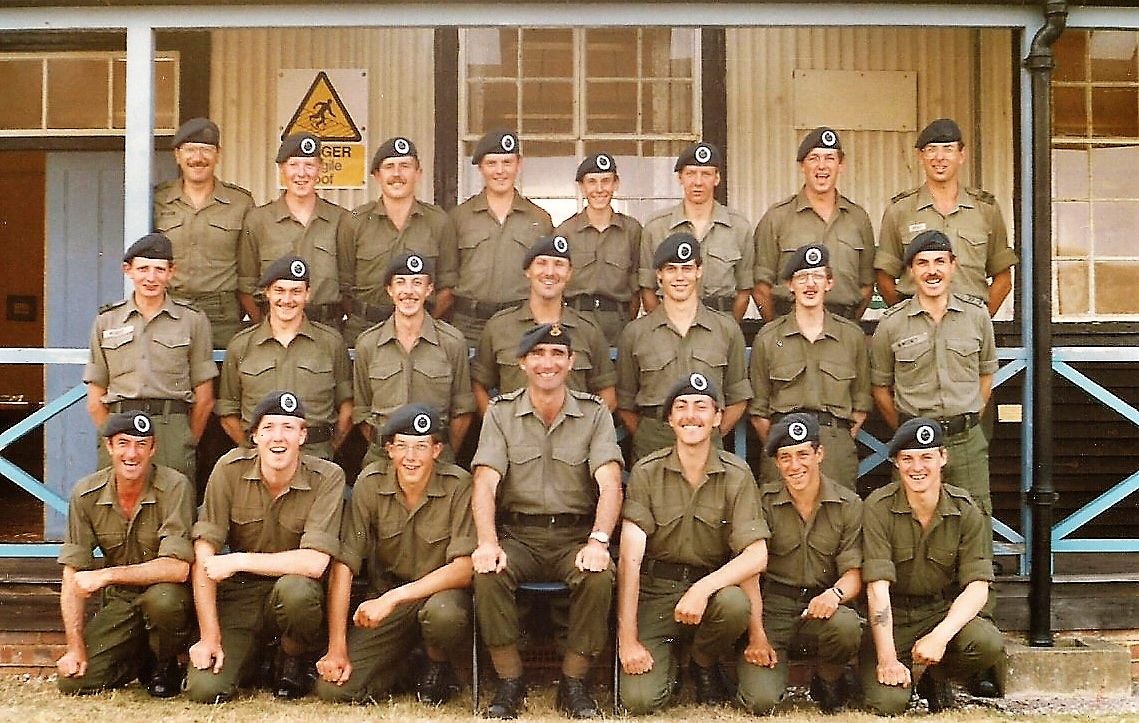 I would have stayed longer with the RAF only the commitment as an officer was quite substantial. After five years with 2503 Squadron, a point came where I had been away for six consecutive weekends, and Val rightly felt that I ought to be spending more time with her. I mentioned this to the Squadron Commander, but his response was that he expected that much commitment from his officers. It was then I saw an advert for the Royal Pioneer Corps (RPC) of the Territorial Army (TA). Their yearly commitment was a lot less than the Auxiliary’s so I contacted them to see if I could transfer across. The use of pioneers goes back many centuries and records of their pay and muster are recorded at Calais in 1346. It wasn’t until 1939 however, that they became a British Army combatant corps and formed into the Royal Pioneer Corps. They were then used for a wide variety of tasks in all theatres of war, including full infantry duties, mine clearance, guarding bases, laying prefabricated tracks on beaches, light engineering tasks, and various logistical operations. The RPC TA was what is known as a “Specialist Unit”. The role of the Pioneers was security, construction, and general labour for the military. To find qualified people, they recruited from all over the country. Their soldiers were required to do the same type of work in the military as they did in their civilian jobs. This meant that the time commitment was a lot less due to not needing so much training. So, with my military background and my years of work in construction, they were delighted to have me join them. The idea was that I’d transfer across, but it wasn’t quite that simple. I had to first leave the RAF and then be commissioned into the Army as a Lieutenant. That was just a formality, however, and, as a result, I have two commissioning parchments from Queen Elizabeth II. The commitment with the RPC was two weekends a year and a two-week annual camp, although officers were expected to do a couple more weekends than that, but nothing to the commitment that the RAF Auxiliaries had required. The Pioneers were based at Simpson Barracks near Northampton, so that did require a bit longer drive each time, but it wasn’t too bad. On joining, I was put into a Company commanded by an ex-Regular, a Major named Rod Othen. Rod didn’t suffer fools gladly, but I liked him, and we got on well and ultimately became friends. I would always salute and call him “Sir” when on duty, but, off duty, it was Rod. Just as I called Rod by his first name, I tended to do that with everyone who I was working with on a regular basis. Also, my habit was to ask people to do something rather than give them an order. Everyone knew that my “request” was really an “order”. I can remember only one occasion when I had to be more precise when a corporal didn’t quite grasp my meaning. This I was able to rectify with one of my “looks” and a “Let me rephrase that, Corporal”. My first appointment was as Company Training Officer. My first weekend was interesting and established my standing within the Company. We were updating kit and one of my Corporals, Billie McKenzie, submitted a pair of boots for exchange. The Quartermaster (QM) said that he wasn’t changing them because he had changed them previously. I was in the store with my guys and heard the QM’s remarks. I went over to look at the boots and the soles were significantly worn down. I mentioned this to the QM who was a Captain and ranked above me and he snapped that they didn’t need changing. I then proceeded to state that they definitely did, and an exchange of words occurred, which is my way of saying that we had a blazing row. He stated that he wasn’t going to change them and told the Corporal to get out. I left the store with the Corporal and told him to come with me and we walked across to the Colonel's office. He was in a meeting with the Company Commanders but on my knock, he called me in. I entered with the Corporal and asked him if he thought that the boots needed changing. “Yes” he replied with a quizzical look. “Can I tell the QM that you said they need changing?” I asked. “Yes” came his reply. We left the office and returned to the QM stores where I informed the Captain that the Colonel said they needed changing. He changed them. I was reminded of this incident many years later when Billie, who had by that time reached the rank of Sergeant Major, asked if I was happy. I replied that I am always happy, whereupon he responded with, “That, sir, is because I make sure you are happy. I’ve seen you when you are not.” Certainly, standing up against a senior officer on his behalf cemented a relationship that lasted throughout our careers and got me a reputation for looking after my men. Looking after your troops and establishing good relationships with those who report to you is something that everyone who joins the military should try to do. This is something I always emphasized when lecturing on management skills. There was another instance when having a good relationship with my subordinate came in handy. One day I was preparing the unit’s pay prior to the pay parade. I was in my office when the Company Commander sent me a message to come to his office immediately. He was in the office two doors down so, thinking this would be a very brief visit, I quickly walked to his office. However, once I got there, he told me to sit down because he was having a meeting. I sat down, painfully aware that I had left the safe open in my office. But, before I had a chance to decide what to do about it, my Pay Sergeant slid up to me and, having locked the safe, discreetly placed the safe key into my hand with no one the wiser. When I was promoted to Captain, I became Company 2i/c (Second in Command). Since I was my own boss and could set my own schedule with the TA, I attended a number of courses on such subjects as Security, Tactical Questioning, and Movement Control (including the Movement Control Staff Officers Course), as well as numerous courses on management and administration. In addition to my unit duties, over time I became involved with the selection of potential officers and assisted in TA Officer Promotion training. I also lectured on the regular management courses, which resulted in the Chief Instructor, Major Elvin Jones, and I writing the book, “Management for the Professions”, which provided an introduction to the process of management. The book was to have a dual purpose as it dealt with the subject areas that were covered on the Management course that Elvin ran for the Army but, as I was lecturing on Management courses at Nottingham Trent University, the book also acted as reading for that course. Consequently, we had a ready market for the purchase of the book. When it was decided that TA officers would benefit from distance learning prior to attending courses, I was tasked with producing the appropriate online learning material. Previously I had been involved in the production of individual study units for Nottingham Trent University. The TA, however, required complete programmes of study to be designed, written, and produced, as well as the appropriate administration systems. This required me to create individual study units for the TA students, which helped ensure that they were properly prepared for their courses and also reduced the amount of time that they needed to be in the classroom, which for a TA soldier was very beneficial. This creative process was also useful to me, particularly later when I started designing online courses for my company. I joined the TA at an especially good time for me, as a number of reorganisations were to take place that would enable me to further my career. Firstly, in 1993, the Royal Pioneer Corps was amalgamated into the Royal Logistic Corps (RLC), This involved the merging of the Royal Pioneer Corps, Royal Corps of Transport, Royal Army Ordnance Corps, Army Catering Corps, and the Postal and Courier Service of the Royal Engineers to form the Royal Logistic Corps. When the RPC joined the Royal Logistic Corps, the three Pioneer companies were renamed squadrons and moved from Northampton to the Prince William of Gloucester Barracks in Grantham. That for me was ideal as it was only about 40 minutes from my home, whereas Northampton was an hour and a half. Shortly after that move, I was promoted to Major and took command of 34 Squadron. At this time Billie McKenzie had reached the rank of Sergeant Major (Sgt Maj) for 34 Squadron. We would frequently walk around the squadron and as we were walking together, he would frequently say: “You don’t want to know this Sir but…” whereupon he would tell me about some incident that had happened in the unit. On a number of occasions, Billie’s insights came in very useful. One time, word of an incident had reached the attention of the overall commander of the Logistic TA units, who asked me about it. I was able to explain the circumstances to him and inform him that it had been dealt with. 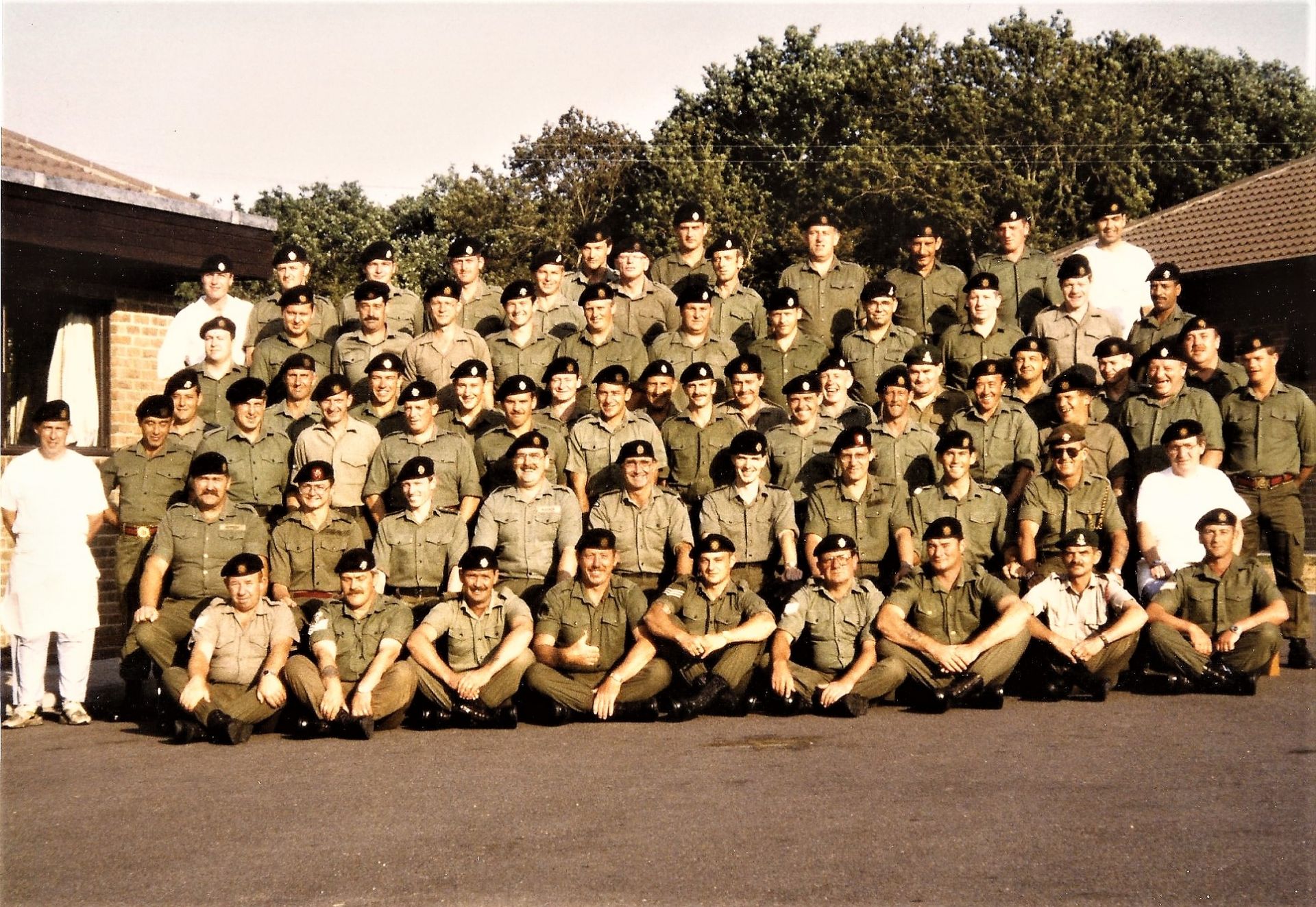 In 1995, the RLC Pioneer Squadrons formed into 168 Pioneer Regiment. Rod Othen was promoted to Lieutenant Colonel and became its first Commanding Officer, and I, as a Major, was his 2i/c, a position I held for three years. On Rod’s retirement, I was promoted to Lieutenant Colonel and took over command. In 1998, the Strategic Defence Review resulted in 168 Pioneer Regiment being tasked with forming two additional squadrons in the Northeast of England. We were fortunate in that we were able to recruit many of the soldiers from disbanding units in the area. To help me with this, I had a Regular Major and a senior non-commissioned officer (SNCO) to assist, but I found myself working almost full-time for the Army. We were able to get the Regiment fully manned with 678 personnel, which made the Regiment the largest unit in the British Army. Being the Commanding Officer of 168 Pioneer Regiment was an honour and a privilege. I worked with some terrific people doing something that I loved. However, all command positions are for a set period of three years, and in 2000 my tour expired, and, due to my age, I was required to retire from the military. I was sure that when the time came for me to leave the military, I would miss it terribly. It had played such a large part in my life as I had been with the military for over 25 years in one way or another. I was one of the very few people who ever served in the Regulars, Reserves, and Cadets, as well as with all three branches of service: the Army, Navy, and Air Force. Certainly, the comradeship that you have in the military is hard to find in civilian life. Like most things in life, however, if you can find something to fill the void then it isn’t a problem. Once again, fate was to take a hand. I was at a cocktail party and was telling someone that I had just retired from the TA, whereupon he asked if I would like to be involved with the Reserve Forces and Cadets Association (RFCA) Committee. I had come across the RFCA in the past when I was establishing new units in the north-east for my regiment and they had provided the barracks. One of their roles is to maintain and support reserve training centres, cadet centres and training areas within which the reserves and cadets of all three services can conduct their activities. Other purposes of the RFCA are to provide advice and assistance to the Defence Council, and to the Army, Navy, and Air Force on matters that concern reserves and cadets. They work with the three services on a local level to deliver support to the reserves and cadets. In addition, they establish and maintain links with the community and employer engagement with regard to defence matters. I expressed an interest and following a meeting with their Deputy Chief Executive, I was informed that I would need to meet with the County Committee Chairman. However, I knew the Committee Chairman well, as we had both been in 2503 Squadron together as junior officers. I was accepted without an interview. Once with the Committee, I was asked to take on the role of Employer Liaison and then later, when the Chairman changed, I was asked to be Vice Chairman. The new Chairman was able to carry out the role for only one year and when he left, I was asked to become Chairman, a position that I held for five years. My role involved giving presentations to business owners and managers about the Reserve Forces and the benefits and skills that it could provide them and their workforce. Also, I gave presentations to organisations such as The Round Table and Rotary Club, as well as to other local business clubs. My Vice Chairman was Roger Pavey, a former Wing Commander with the RAF, and he and I would attend exhibitions and promote the advantages of the Cadets and the Reserve Forces, something that I could speak about from my own personal experience. 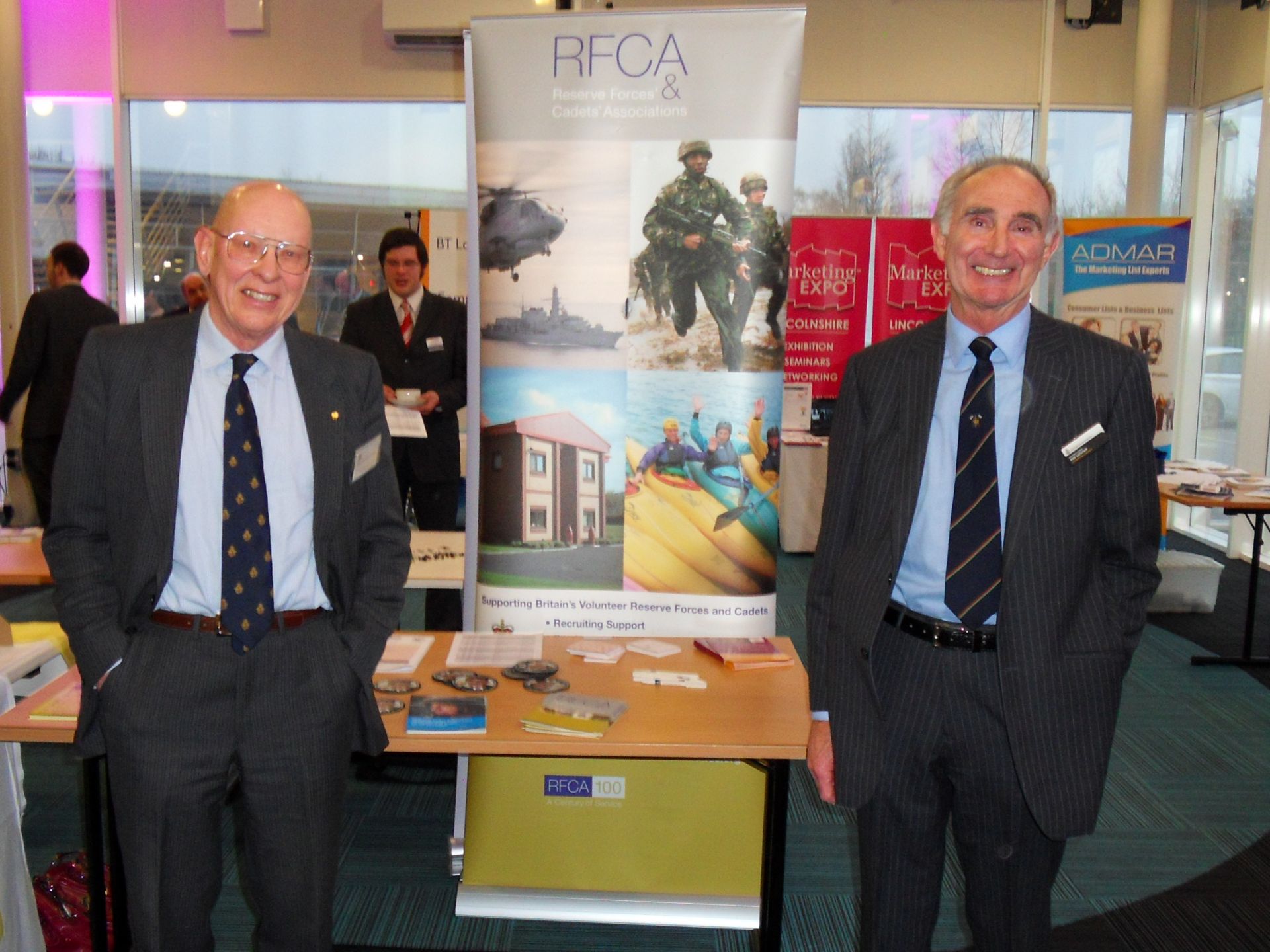 On one occasion I turned up for a meeting held at one of our Army camps. I was Vice Chairman at the time and reported to the Guardroom informing them that I was attending the RFCA Committee Meeting and that I was Colonel Gatepain. Looking down his list of attendees he exclaimed “Colonel Gatepain VC”, and respect radiated from him. He had obviously interpreted VC as Victoria Cross, the highest award for bravery, rather than Vice Chair. It was only as I was walking away that I realised his mistake. I decided not to go back and enlighten him. A regular function for us was to hold dinners to thank companies for the support that they had given to their employees who were in the Reserves. I would also host other events, such as the International Air Show. Hosting these events required me to be accompanied. I was divorced by this time but was fortunate enough to be able to enlist the help of Anne. 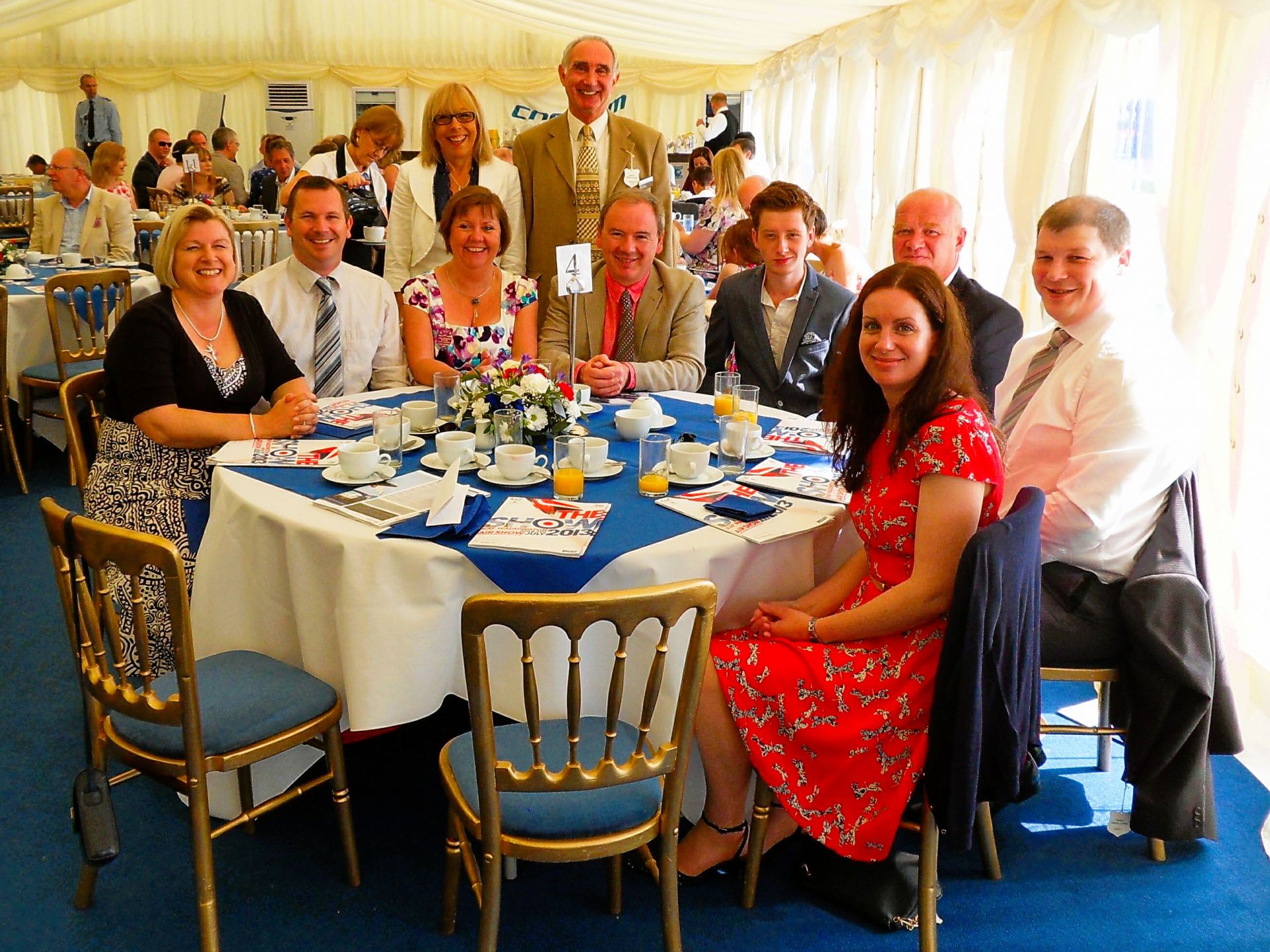 We would also stage dinners at Army Barracks to give our guests an insight into the formalities of military life and etiquette. These were very popular, as our President happened to be the Lord Lieutenant of Lincolnshire, who would also attend, and people enjoyed meeting him. My work with the RFCA once got me an invite to Buckenham Palace for a Garden Party, so I have been able to joke that I have had tea with the Queen. 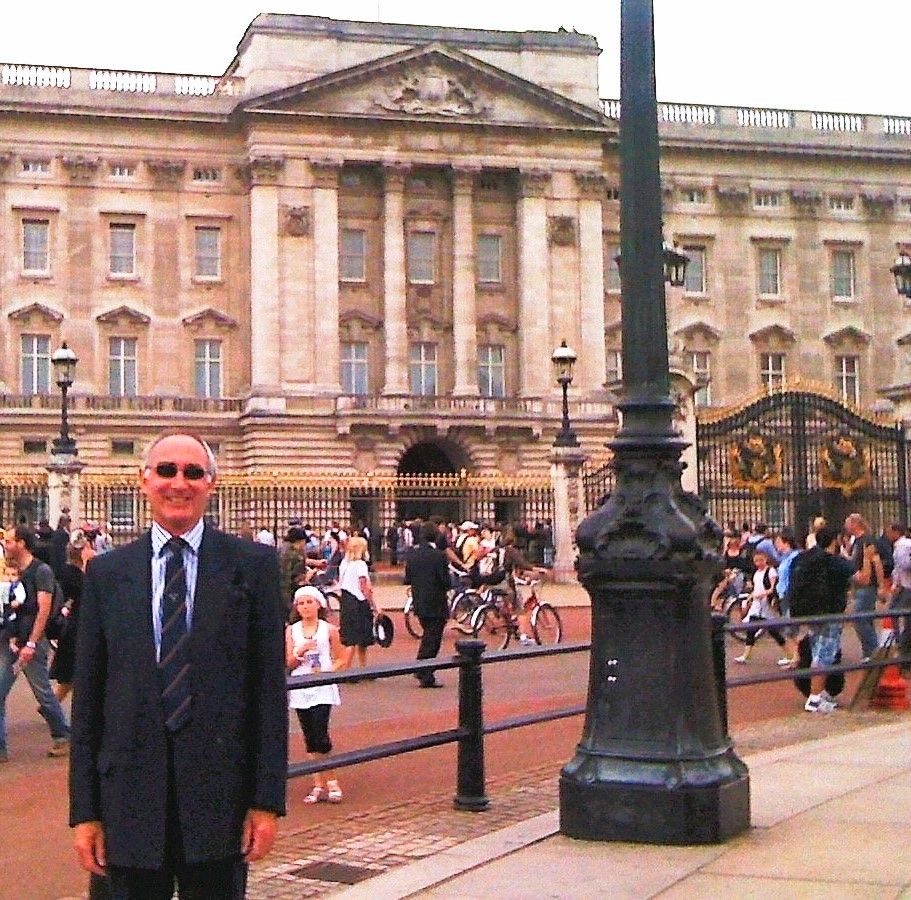 Being part of the RFCA Committee also meant that I could maintain my links to the military, particularly my old unit in the RLC. I was able to join the Officers Mess at Grantham and attend many of their functions, thus being able to don my uniform Mess Kit and meet many of my old comrades. 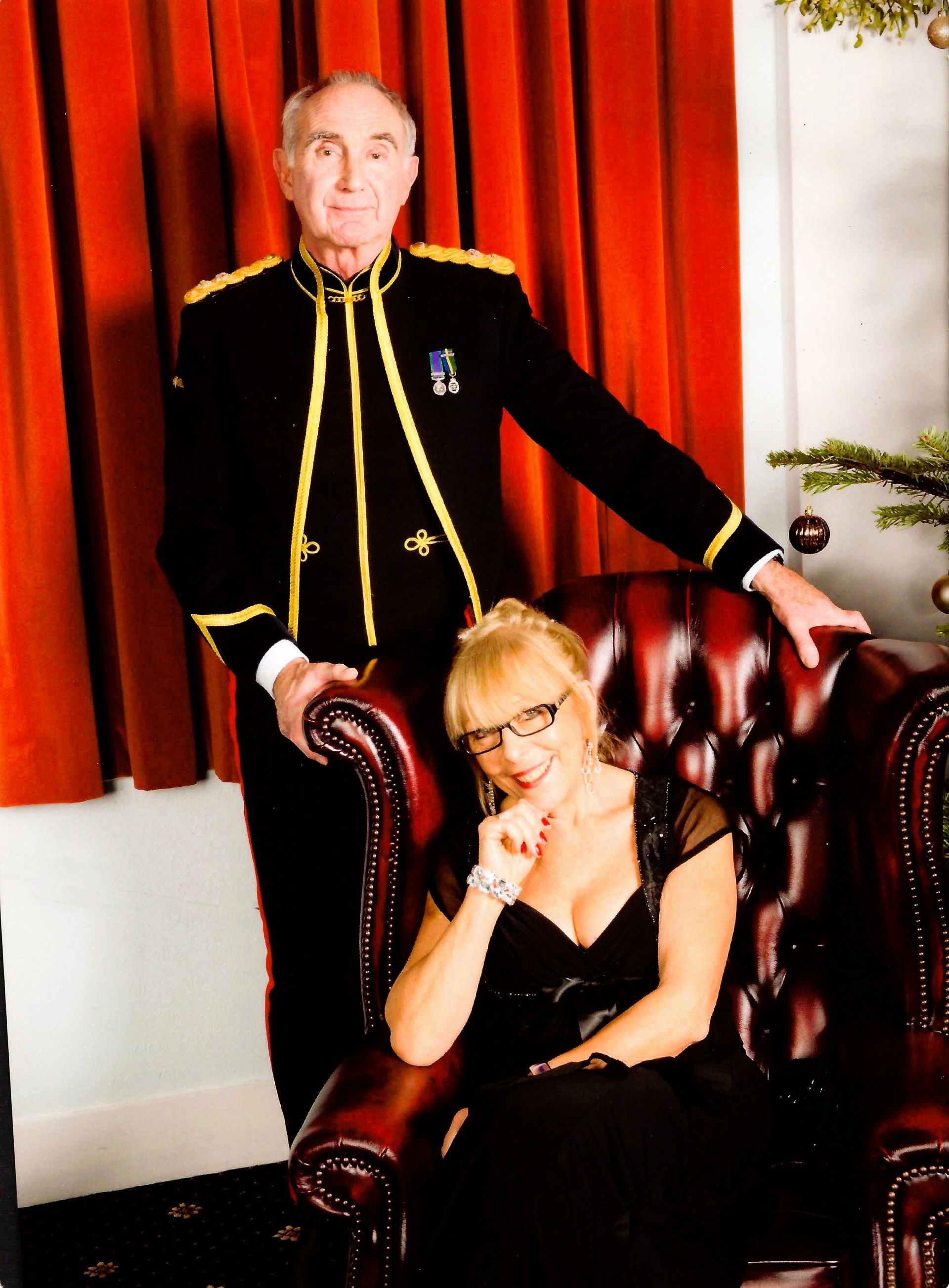 Anne and me at the Officers Mess Ball. Presenting Marine Endeavor Trophy to winning cadet. |
|
|
|
|
| Site Map |
